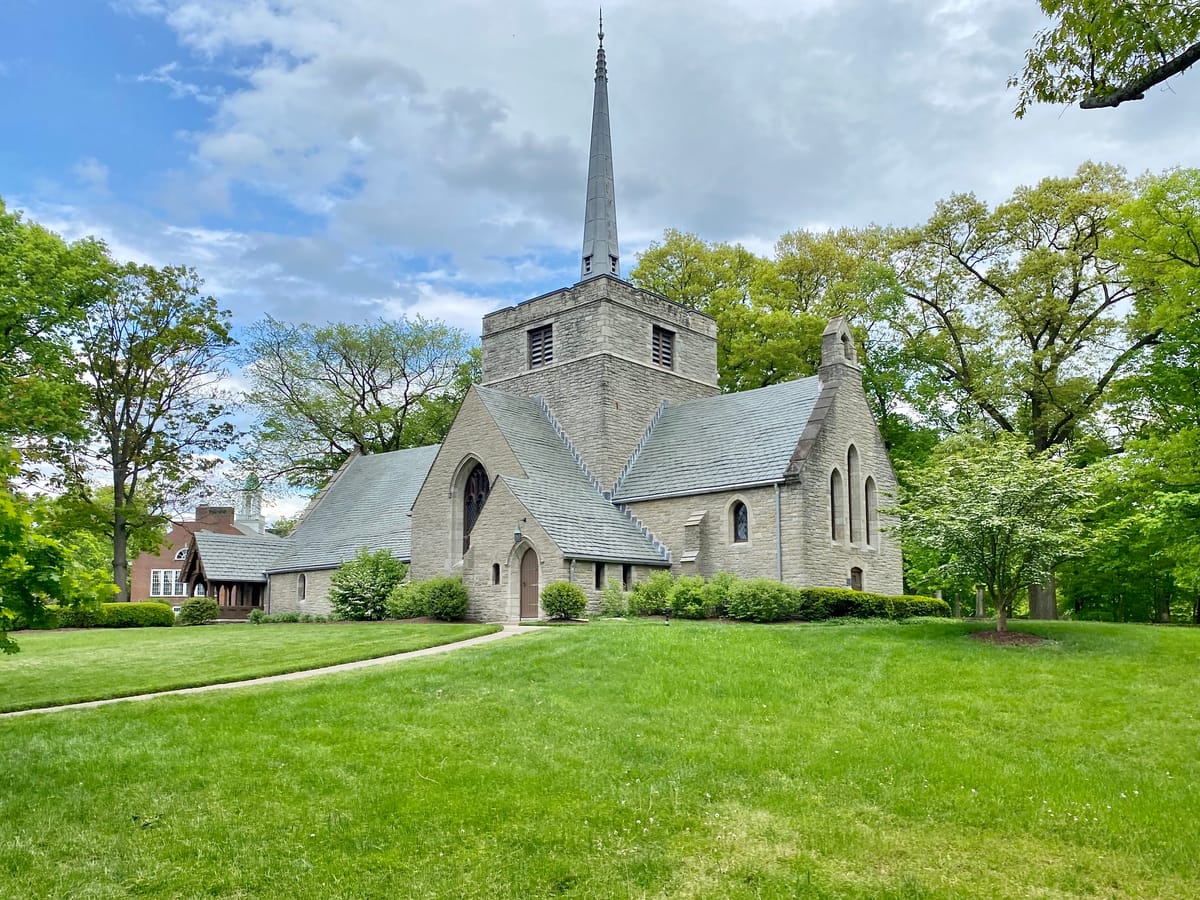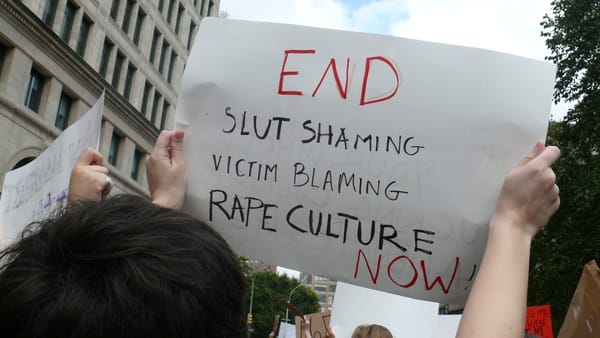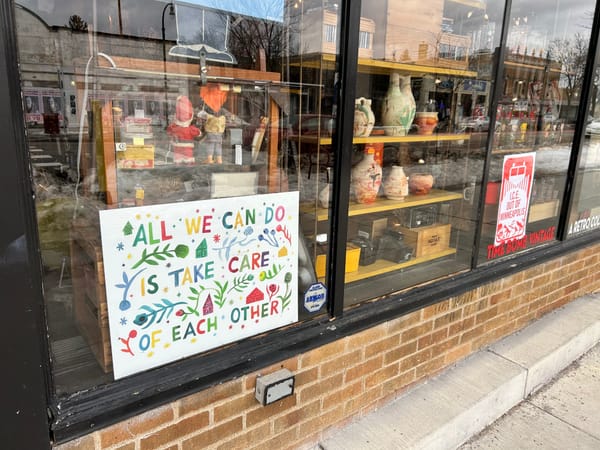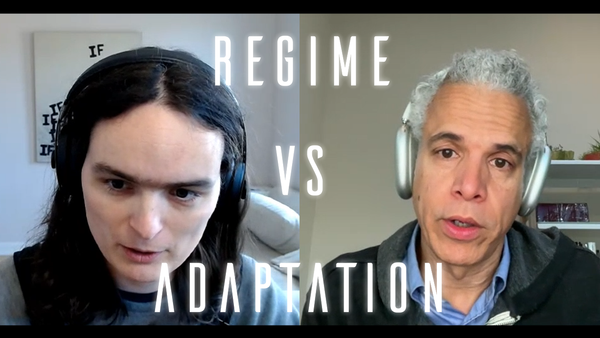Reclaiming Our Inheritance
It is time to take back the traditions, institutions, and ideals that lapsed Christians have allowed others to define.

A distinguished line of scholarship on evangelical Christianity and conservative politics has substantiated the observation that Christian identity is fundamental to the new fascism, but recent works like Talia Lavin’s Wild Faith and Kristin Kobes du Mez’s Jesus and John Wayne persuasively demonstrate that the exchange has been reciprocal: if being Christian for a long time one pushed one towards authoritarian parties, it is increasingly clear that being authoritarian—in one’s personal and professional life as well as in one’s politics—is for many believers now much more definitive of their faith than any particular doctrine. Many religious writers on the right are more than happy to confirm this trajectory; in books like Toxic Empathy: How Progressives Exploit Christian Compassion and The Sin of Empathy: Compassion and its Counterfeits, writers like Allie Beth Stuckey and Joe Rigney energetically confirm the suspicion that they regard cruelty and domination as not merely compatible with Christianity but as its deepest expression. In the face of this politico-religious movement, Lavin and others understandably conclude that the best alternative is exiting the thing entirely: the contemporary unification between Christian religion and fascist politics is too seamless, too complete, to make anything other than repudiation viable.
While acknowledging the force of this line of thought, I want to make two arguments against it. First, at least in the case of lapsed Christians like myself, we can’t do it: Christian identity is so central to and definitive of our ways of life that it cannot be abandoned, at least not without a much more dramatic social reconfiguration than merely not going to church. Second, we shouldn’t do it: instead of thinking of Christianity as a discrete entity to be resisted, we should regard it as a distributed and wayward force to be directed. In fact it seems like a monolith in part because those of us horrified by its contemporary incarnation have abandoned the field, leaving some of the worst people in the world to define what it means to be “Christian.” And by doing so, we have let ourselves be disinherited. Without in any way meaning to, lapsed Christians gave to others the right to define part of their own identity. But these traditions, institutions, and ideals are ours still, and their meaning and function are open to contestation. It is time to take them back.
Let me come at that first argument via my own story. I left the Catholic Church when I was eighteen for what seemed at the time obviously decisive reasons:
- I no longer believed in the existence of an omnipotent, omniscient, and benevolent God.
- I did believe that such a God was logically inconsistent with the existence of widespread forms of natural suffering, such as disease and famine.
- I also believed that the notion of a soul carrying our personality and memories beyond the existence of our corporal bodies was incoherent or at any rate unsupported by the preponderance of the evidence.
- As I learned more about its history, Christianity as an institutional force seemed much more often to be on the wrong side of key moral and political issues.
The many kind and thoughtful friends and family members who helped me think through these objections as a teenager disagreed with these claims, of course, but they all accepted their importance. That’s to say that everyone agreed with the connection between these philosophical propositions and my institutional and social life; that someone who didn’t believe in souls couldn’t be a Christian, and that to disagree with the moral history of Christian institutions meant one should leave them.
I now think that, back in the early-aughts days of my college life in East Tennessee, both sides here got it wrong. Not that such debates aren’t important to Christian identity, but that whether one is a Christian does not in fact hinge upon them as much as we thought it did. In The Lies That Bind, Kwame Anthony Appiah describes two related fallacies about religion: first, the fallacy that a religion is defined by its beliefs; second, the fallacy of “scriptural determinism,” that a religion is defined by what its source texts say. As he sums it up, it is to think “that to be a believer is to believe what’s in the scriptures, as if one could decant from them, like wine from an urn, the unchanging nature of a religion and its adherents.” These fallacies assume that the key determiner of religious identity is what we say to ourselves in our mental interiors and not what we actually do with our lives. And aside from those mental interiors, surprisingly little changed in my practical life (well, I did stop going to church, I’m not completely insane). I continued to have family holidays on Christmas and Easter, visited churches on European holidays, and wrote papers on themes like the Black Church’s use of Jesus as a revolutionary figure. I kept a fair amount of choral music on my playlists. More importantly, I continued to think that mercy, kindness, and love were all important virtues, that we inevitably fail to be the people we want to be and therefore owe each other some grace and forgiveness, and that there are substantively real moral truths and that “cruelty is evil” is one of them. In that sense there was a kind of shortsightedness or maybe arrogance in thinking that Christianity was an aspect of my identity I could alter as easily as just deciding I didn’t believe anymore. Religion is sedimented into our lives at levels deeper than those of overtly formed beliefs, and at those levels I hadn’t stopped being a Christian at all.
And it was shortsighted in another sense too. There can be a kind of laziness that comes with disavowing a group one has been a part of, as if we can free ourselves of responsibility for it by simply leaving, like washing dirt off our hands. Whatever happens next, it will never be true that you weren’t a part of it. It’s the flip side of the old existentialist insight that you have absolute freedom in whatever you do next: once you have done something, it is a fundamental and unalterable fact that you did it. Sartre called it existential despair: we are tempted, constantly, to explain away the hard facts of what we did do by appeal to what we were trying to do, what we hoped to do, what we were prevented from doing, what we have stopped doing and would never do again. “No doubt this thought may seem comfortless to one who has not made a success of his life,” Sartre writes, rather grimly: “On the other hand, it puts everyone in a position to understand that reality alone is reliable.”
That’s a polemic and guilt-ridden way to put it, so let me come at the thought from another angle: claiming a Christian identity is good, actually. For those of us who grew up in various American Christian churches, that tradition—its cultural norms, its artistic productions, its literal buildings, etc.—is our birthright, part of the world our parents are leaving to us. And by leaving the church decisively, we have let ourselves be disinherited by those for whom we have no respect and would least wish to have positions of cultural authority. We let them off easy by believing that the Christians could go one way while we went another, conveniently leaving them in charge of the boards of trustees and the contents of Sunday schools. They have stolen from us something that’s rightfully ours: a position in the moral community and the right to demand acknowledgment and consideration of our identities and views. But it is within our power to reclaim that position and prevent the kind of silent consensus that has stabilized the Christian identity as an authoritarian one.
It's worth doing, first of all, for those buildings. In the wake of the 2024 election, many Democrats and leftists decried the failure of the party to build a thick identity in the lives of its partisans. Writers like Ned Resnikoff have argued that for most of us, the Democratic Party is purely an electoral organization, neither a source of meaning and practical orientation nor a reliable source for the delivery of valuable services. People more informed than me have argued that this is a structural problem and that the Democratic Party can’t become the kind of rich social organization that’s necessary, certainly not overnight; more than that it’s unclear whether the kind of investment in electoral politics this would involve is either healthy or likely to produce the desired outcomes. But what very clearly can become that—in fact, is begging to become that—are the vast network of churches spread out across American cities. They’re basically all empty: church attendance has fallen to absurdly low numbers, and the average age of the remaining attendees is very high. Moreover, many of these churches know that they are dying and that radical change is necessary if they’re going to survive. The odds are excellent that right now, there is a church within a few miles of you that would love your attendance and leadership and would be willing to engage your moral and political ideas—radical claims like “cruelty is bad” and “rape is evil”—in return. Or at any rate, that was my experience. Two blocks from my house is a lovely United Methodist Church with a large meeting hall, a great industrial kitchen, and a tiny, elderly congregation.
I had some vague familiarity with Methodism—David Wesley and singing?—but my thought was that it wasn’t actually very significant what this church was committed to doctrinally, since I’d be a part of helping to shape its future anyway. Plus they ran a monthly free community dinner and occasionally flew Pride flags, so I’d thought they be open to my idea, borrowed from left writers doing think pieces after the election, of offering free childcare. And when I pitched the idea of a monthly Kids’ Night Out series, it turned out they were more than willing to host and pay for it. Second and correspondingly, we can insist within such communities on the value of walking the walk, on actually living in accord with the values so often professed. It’s only a facile Protestantism that leads to the idiosyncratic and ultimately implausible account of belief so common in American religious culture. “I accept Jesus Christ as my lord and savior,” for the many who say such things, is an entirely private affair: it’s something one says to oneself about oneself. Whatever one thinks about beliefs about Jesus Christ, this is not a persuasive way to understand how beliefs in general work, because they are fundamentally public. They’re public first in the sense that they’re reflected in your actions and habits; the things you actually believe, as opposed to what you simply say, appear physically in the world. They’re also public insofar as they contribute to humanity’s shared comprehension of the world. No one has ever made this point more effectively than William Clifford:
Our words, our phrases, our forms and processes and modes of thought, are common property, fashioned and perfected from age to age; an heirloom which every succeeding generation inherits as a precious deposit and a sacred trust to be handled on to the next one […] Into this, for good or ill, is woven every belief of every man who has speech of his fellows. An awful privilege, and an awful responsibility, that we should help to create the world in which posterity will live.
There’s a libertarian impulse that leads one to assume hey, we can all believe whatever we want, at least as long as we leave each other alone in what we go on to do. And while there are very good reasons to be suspicious of any political attempts to establish norms for beliefs, Clifford is arguing that there are nevertheless moral norms in this arena. It’s not a world in which anything goes. Instead what we believe contributes substantively to the world our neighbors have to live in and which we are passing on to our children. To insist on a moral license granted by the political right of privacy of belief is ultimately a shirking of a duty.
Appiah points out an old distinction between orthodoxy and orthopraxy—believing right and acting right—and notes persuasively that our contemporary conception of religion emphasizes the first over the second. But it’s worth adding to the distinction the idea that they can’t really be separated: that a lack of orthopraxy is evident of a lack of orthodoxy. Recognizing this clarifies a key point: even I, and probably many of the lapsed Christians reading this essay, am much, much more Christian than many of the people who proudly claim that title today. I don’t mean exactly to call these Christians hypocritical, although it is true that we should look at their actions as well as their statements to see what beliefs they hold. Rather, if we think of Christianity’s lengthy tradition of moral and metaphysical thought as the center of a Venn diagram, there’s at least as much overlap between the circle of my beliefs and the Christian tradition as there is for a writer like Stuckey, who openly warns Christians against compassion and mercy when it seems to support progressive politics, and we both have more overlap than the members of the “Army of God,” who as Lavin explains have a long history of bombing abortion clinics and murdering health care providers.
Kristin Kobes du Mez starts from the premise that many evangelical Christians are not hypocrites so much as working with a distinctly masculinist and militarist conception of their faith, and that Donald Trump is not a betrayal but a realization of it. But if one can coherently believe that a cruel rapist like Donald Trump is an example of one’s Christianity, then it’s clear the boundaries defining what makes a“Christian” are a lot further apart than we knew. Once we’re at the thought “man, I’m more Christian than that guy, and I don’t even believe in God,”we should consider the follow-up of: “so then why does he get to be called a Christian and I don’t?”
So finally, there is a power that comes in the capacity to act together to shape something so broad. The recently deceased Catholic philosopher and theologian Alasdair MacIntyre wrote in his great work After Virtue that the Christian world is living in a kind of dark age, inhabiting a shattered world in which its practices are saturated with a moral vocabulary that no longer makes sense because the core concepts were developed in a world radically different from our own. But he also thought that the practices he was describing weren’t written in stone: that they had histories and were capable of change, and that part of participating in those practices involves contributing to the narratives about what they really are We do not have to cede the immense resources of the Christian tradition—conceptual, organizational, and literally infrastructural—to the right. They are welcoming new members, and we should take them up on the invitation.
Featured image is Mariemont Community Church, by Warren LeMay




